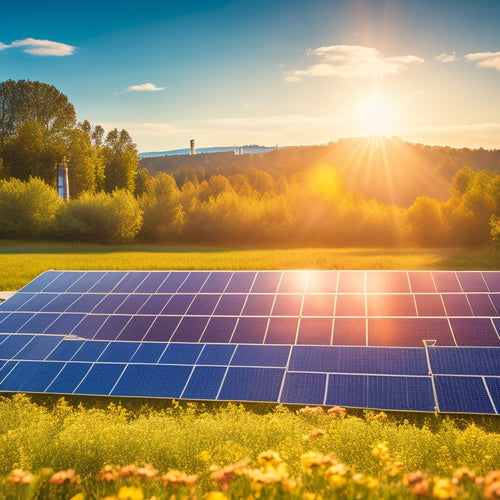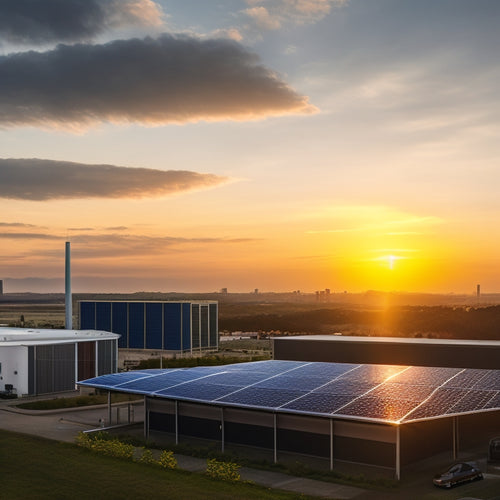
Residential Battery Storage Systems
Share
You can safeguard your home from power outages and grid failures with a residential battery storage system, ensuring uninterrupted electricity supply to essential appliances. These systems activate instantly during outages, maintaining energy flow and protecting sensitive electronics from data loss and power surges. By integrating with solar panels, you can reduce your carbon footprint and reliance on the grid, while also optimizing energy usage and potentially lowering energy costs. With the right system, you can store excess energy for use during non-sunny periods, enhancing energy independence and sustainability - and there's more to investigate about how these systems can benefit your home.
The Essentials
- Residential battery storage systems provide backup power during outages, ensuring continuous electricity supply to essential appliances and medical equipment.
- Integration with solar panels enhances energy independence, reduces reliance on the grid, and minimizes fossil fuel reliance for a greener environment.
- Deep Cycle Battery Technology, such as Lithium-Iron Phosphate (LiFePO4), offers longer cycle life and reliability for residential power systems.
- Assessing daily power requirements and energy usage patterns is crucial for selecting an adequate battery system and optimizing energy management.
- Residential battery storage systems offer benefits including backup power, energy independence, cost savings, and a reduced carbon footprint.
Backup Power During Outages
When the grid fails, your residential battery storage system kicks in, providing you with power when you need it most.
This reliable energy source guarantees your home remains comfortable and safe during outages, keeping your lights on and critical appliances running.
With a backup power system, you'll have peace of mind knowing you're protected from the uncertainty of grid outages.
Additionally, a backup power system safeguards your sensitive electronics home energy storage from damaging power surges and data loss, and also keeps essential devices, such as life-saving medical equipment, powered and operational.
Power When You Need
A grid outage can strike at any moment, leaving you without power when you need it most. With a residential battery storage system, you can guarantee power when you need it.
During an outage, your system seamlessly switches to battery mode, providing backup power to your home. This means you can continue to power essential appliances like refrigerators, medical equipment, and lights, even when the grid is down.
By integrating your system with solar panels, you can maximize your energy independence and reduce your reliance on the grid, much like with Renewable Energy solutions.
With a high-quality battery storage system, you can also optimize your energy consumption to reduce your electricity bills.
With smart energy management, your system optimizes energy usage and storage to maximize cost savings. It prioritizes your energy needs, guaranteeing that critical appliances receive power first.
This intelligent approach to energy management also helps you reduce your reliance on the grid, saving you money on your energy bills.
Reliable Energy Source
Your residential battery storage system serves as a reliable energy source, providing backup power during outages. This means you'll have a steady supply of electricity when you need it most, even when the grid goes down.
With a residential battery storage system, you're no longer at the mercy of the utility company or vulnerable to power outages caused by natural disasters or infrastructure failures. By alleviating the burden of high energy bills, you can also reduce grid dependence and enjoy greater energy independence.
This level of energy independence is especially important for those who rely on critical medical equipment, refrigeration, or other essential systems. You'll have the peace of mind that comes with knowing you're prepared for any situation.
Additionally, your system will seamlessly integrate with the smart grid, allowing you to store excess energy generated by your solar panels or wind turbines during the day and use it at night or during outages.
Reduced Carbon Footprint Guaranteed
You're looking for eco-friendly energy solutions that reduce your carbon footprint, and residential battery storage systems can deliver.
By integrating these systems with renewable energy sources like solar or wind power, you'll greatly lower your reliance on fossil fuels and decrease emissions today.
With the help of off grid solar systems, you can store excess energy generated during the day for use during the night or on cloudy days, further reducing your carbon footprint.
By leveraging renewable energy systems, you'll not only contribute to a cleaner environment but also enjoy potential savings on your energy bills.
With a reduced carbon footprint guaranteed, you'll not only contribute to a cleaner environment but also enjoy potential savings on your energy bills.
Eco-Friendly Energy Solutions
As the world shifts towards a more sustainable future, homeowners are increasingly seeking eco-friendly energy solutions that reduce their carbon footprint.
You're likely no exception, and that's why you're considering residential battery storage systems.
These systems offer a reliable way to store excess energy generated from your solar panels, allowing you to power your home even when the sun isn't shining.
Lower Emissions Today
By integrating a residential battery storage system with your solar panel setup, you can greatly decrease your reliance on the grid and lower your emissions today.
This means you'll be producing and consuming clean, renewable energy, reducing your carbon footprint and contributing to a sustainable future.
With renewable integration, you'll be able to store excess energy generated by your solar panels during the day and use it at night or during power outages, minimizing your dependence on fossil fuels.
Deep Cycle Battery Technology
You're likely familiar with the importance of a battery's cycle life, which measures how many charge/discharge cycles it can handle before capacity degrades.
When selecting deep cycle batteries for your solar power system, it's crucial to reflect on reliable power storage and the type of battery that can provide a consistent electricity supply.
When it comes to deep cycle battery technology, you'll want to contemplate energy storage capacity, which determines how much power your system can provide during an outage.
Battery Cycle Life
With deep cycle battery technology, a vital aspect of residential battery storage systems comes into play: battery cycle life. You're likely wondering how long your battery will last and how many charge/discharge cycles it can handle. The answer lies in the battery's ability to maintain its capacity over time.
Battery cycle life is directly tied to capacity degradation, which occurs when a battery's capacity to hold a charge decreases. This degradation is influenced by factors such as the type of battery, usage patterns, and battery management. Effective battery management is essential in minimizing capacity degradation and maximizing cycle life.
Here's a breakdown of battery cycle life expectations for different types of batteries:
| Battery Type | Cycle Life |
|---|---|
| Lead-Acid | 200-500 cycles |
| Nickel-Cadmium (Ni-Cd) | 500-1000 cycles |
| Nickel-Metal Hydride (NiMH) | 500-1000 cycles |
| Lithium-Ion (Li-ion) | 1000-2000 cycles |
| Lithium-Iron Phosphate (LiFePO4) | 2000-3000 cycles |
As you can see, LiFePO4 batteries offer the longest cycle life, making them a popular choice for residential battery storage systems. By choosing the right battery type and implementing effective battery management, you can enjoy a longer-lasting and more efficient energy storage solution.
Energy Storage Capacity
Your residential battery storage system's energy storage capacity is a critical aspect to assess, as it directly impacts the amount of power available during outages or peak demand periods. This capacity is typically measured in kilowatt-hours (kWh), and it determines how long your system can provide power when the grid is down.
When selecting a battery system, you'll want to evaluate your energy needs during an outage. For example, if you want to power your refrigerator, lights, and communication devices for 8 hours, you'll need a system with sufficient battery capacity.
Look for systems with high energy efficiency, as they'll provide more power per unit of battery capacity.
Deep cycle batteries, like those used in residential battery storage systems, are designed to provide a steady flow of energy over a long period. They're built to handle the demands of daily charging and discharging, making them ideal for off-grid or backup power applications.
Assess Your Energy Demands
You need to understand your energy usage patterns to determine the ideal residential battery storage system for your home.
To do this, you'll want to analyze your daily power requirements, including the total amount of energy you use during peak hours and your overall energy consumption throughout the day.
By evaluating these factors, you'll be able to identify the capacity and type of battery storage system that will effectively meet your energy demands.
Additionally, considering renewable energy solutions and solar panel battery storage(https://www.illchanterthistlater.com) options can help you make an informed decision about your energy storage needs.
Energy Usage Patterns
Evaluating energy demands is essential in determining the ideal residential battery storage system. You need to understand your energy trends and consumption habits to guarantee you're getting a system that meets your specific needs.
Start by analyzing your past energy bills to identify patterns and peaks in your energy usage. Look for seasonal variations, daily habits, and appliance-specific consumption.
Are you an early riser who turns on lights and appliances as soon as you wake up, or do you work from home and use energy-intensive devices throughout the day?
Do you have energy-hungry appliances like electric water heaters or HVAC systems? Answering these questions will help you pinpoint areas where you can optimize your energy usage.
Daily Power Requirements
Understanding energy trends and consumption habits sets the stage for evaluating daily power requirements. To determine your daily power needs, you'll need to assess your energy demands. This involves identifying your peak load, which is the maximum amount of power you require at any given time.
Peak load is vital in sizing your battery storage system, as it guarantees you have enough power to meet your energy needs during periods of high demand. You'll want to take into account your energy usage patterns, including when you use the most energy and what appliances contribute to your peak load.
For example, if you have a large family or multiple electric vehicles, your peak load will be higher. Implementing energy conservation measures, such as energy-efficient appliances and lighting, can help reduce your peak load and overall energy consumption.
Longer Cycle Life Guaranteed
When you invest in a residential battery storage system, you expect it to last for years to come.
A longer cycle life guarantee guarantees that your battery will retain its capacity to store energy over an extended period, making it a more reliable and cost-effective solution.
With extended battery durability, you can rest confident that your system will continue to meet your energy needs without sacrificing performance.
Extended Battery Durability
Get ready to access the full potential of your residential battery storage system with extended battery durability, a vital factor that guarantees a longer cycle life.
This means you can store more energy, use it when you need it, and reduce your reliance on the grid. With extended battery durability, you're free to live life on your own terms.
To maximize your battery's lifespan, it's important to follow proper battery maintenance tips.
This includes monitoring your battery's state of charge, avoiding deep discharges, and keeping your battery away from extreme temperatures.
Temperature effects can greatly impact your battery's performance, so it's important to install your system in a temperature-controlled environment.
Frequently Asked Questions
Can I Install the System Myself or Do I Need a Professional?
You're wondering if you can tackle a DIY installation, but safety considerations are paramount; without proper knowledge, you risk electrical shock, fires, or voiding warranties, so it's recommended to hire a professional for a secure and efficient setup.
How Do I Monitor and Control My Battery Storage System Remotely?
You'll need a system with remote access capabilities, allowing you to monitor and control your energy management from anywhere, giving you freedom to optimize your energy usage and stay connected to your system, no matter where you are.
Are Residential Battery Storage Systems Compatible With All Inverters?
You'd think every inverter on the planet would seamlessly connect with your battery, but sadly, that's not the case! Battery chemistry and inverter types can be finicky, so you'll need to ascertain compatibility before making a purchase, or you might end up with a useless brick!
Do Battery Storage Systems Work With Existing Solar Panel Systems?
You can seamlessly integrate your existing solar panel system with a battery storage solution, ensuring ideal solar energy integration, but be aware that battery lifespan considerations may impact overall system performance and longevity.
Are There Any Government Incentives for Installing a Battery Storage System?
As you flip the switch on your sustainable dreams, you'll find Uncle Sam's got your back; federal programs and local rebates sweeten the deal, offering cash incentives to offset installation costs, giving you the freedom to utilize the power of the sun, on your terms.
Final Thoughts
As you utilize the power of residential battery storage systems, imagine a safety net that catches you when the grid drops, a carbon-reducing anchor that holds fast to your eco-friendly values, and a reliable heartbeat that pulses with deep cycle battery technology. By evaluating your energy demands, you'll reveal a longer cycle life, guaranteed. Your residential battery storage system is the essential key that opens a brighter, more sustainable future - and with it, you'll be shining a guiding light of independence, illuminating the path to energy freedom.
Related Posts
-

Is Switching to Green Energy Solutions Easy
Switching to green energy solutions isn't just easy; it's also beneficial. You can greatly cut utility costs and enjo...
-

Advantages of Solar Generating Systems Over Traditional Energy
Solar generating systems provide several key advantages over traditional energy sources. You'll experience lower long...
-

Advantages of Commercial Solar Battery On-Site Storage
By investing in a commercial solar battery on-site storage system, you can greatly reduce your energy grid dependence...


